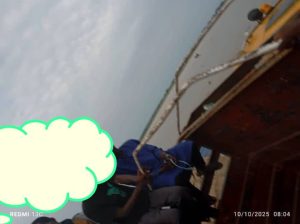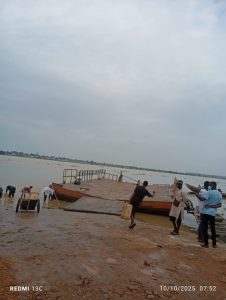By Yisau Babatunde

On a cold morning in October, Ibrahim Muhammad, a 300-level Sociology student at Usmanu Danfodiyo University Sokoto (UDUS), made his way to Ajia Alimo road in Sokoto market to begin his journey home. With a worried but determined expression, he climbed onto the back of a moving trailer heading toward Kwara State.
Since his first year in the university, Ibrahim has always struggled to afford transport fare between Sokoto and his hometown. Before discovering that he could travel with just N5,000 by hitching a ride on a trailer, he used to spend N20,000 and above on transportation alone.
“We don’t do this because we want to,” Ibrahim said, gripping his bag tightly. “But with transport fares now having tripled, this is the only way to reach Ilorin. The buses are just too expensive. We either risk it or stay stranded.”
Ibrahim’s experience is not unique. Samsudeen Wadud, a 200-level Engineering student, shared a similar story. When he heard that the bus fare to Ibadan had risen to between N22,000 and N25,000, he knew he couldn’t afford it. His parents had sent him N15,000, which was not even enough for the trip to his state.
“When a friend told me about using trailers for just N5,000. I didn’t think twice; I gladly said yes,” he recalled.
Before the removal of fuel subsidy by President Bola Ahmed Tinubu in 2023, travelling from Sokoto to Kwara, Oyo, or Lagos State through Niger and Kontagora was relatively affordable. Then, students could board commercial buses for between N8,000 and N10,000 depending on the season.
But since the subsidy removal, petrol prices have tripled, and transport fares have sharply increased, which now cost between N22,000 and N25,000. For many students, especially those from low-income families, travelling home by trailer has become the only option left.
Same Path, Different Mindset
For some students, the trailer journey is not just about cost, it’s about safety. Muhammad Ridwan, a master’s student at UDUS, told Digest Press that he now finds peace in travelling by trailer, not just because it is cheaper, but because he believes it is safer.
“I’ve been using trailers for a long time. I’ve never had an accident, never been robbed or kidnapped,” he said. “Look at the recent attacks on students passing through Niger State, they target buses. Trailers are actually safer for me if I must say.”
University students being kidnapped on is Nigerian road is not a new trend. In 2024, at least 20 university students from the University of Maiduguri were abducted by gunmen in Benue State while going for a medical conference.
Similarly, in October 2025, Basheerah Ojedeyi, a newly inducted Radiography graduate of UDUS, was abducted in Niger State and spent weeks in captivity before her release after a huge ransom payment.
Beyond the Price: A Torturous Journey
What begins as a cost-saving decision often turns into a nightmare for many student commuters. Samsudeen Wadud recalled how his trailer, loaded with cows, rams, and other goods, became unbearable during the journey.
“It was not the best way to go home, but it was better than staying at school,” he said. “Just a few hours into the trip, the smell of animal urine and feces filled the air. I vomited several times. I don’t think I’ll ever board a trailer again.”
Another student, Abdulraheem Habib, shared a similar experience. Despite swearing never to travel that way again, he later did so due to financial hardship.
“When it rains, I’m soaked,” he said. “When it’s sunny, the metal burns my skin. You can’t even stop to ease yourself, you only find a way to ease yourself when the trailer is on the move. It’s a terrible experience.”
Abdulraheem also recalled one frightening incident: “We were on a trailer going to Kontagora when one of the tires burst. The driver didn’t stop. Everyone screamed. I thought it was the end. But during the next holiday, I still found myself climbing another one. What can I do?”

Crossing the Auna River: A Journey of Fear
For Ibrahim Muhammad, the most terrifying part of his journey is crossing the Auna–Salka–Ibeto route in Niger State, where a collapsed bridge forces travellers to use an old ferry.
“It was terrifying,” he said. “The ferry was rusty and shaking. There were no life jackets, and the engine sounded weak. I just held onto the metal and prayed to survive.”
“Every wave felt like danger. At one point, my hand slipped, and someone had to pull me back. That day, I saw death. I questioned why I agreed to travel this way.”
A Village of Survivors
In Auna, risk has become part of their daily life. For locals, the ferry is not just a transport system alone, it is a means of survival.
“We live by risk here,” said Mallam Sani, a petty trader. “If the ferry stops, we wait. If the engine fails, we fix it. We have no bridge, no alternative. This is our only road.”
The same river serves as a fishing ground, laundry site, and even a water source for some villagers. Sanu added that the water isn’t clean enough for drinking, because people wash their cloths and vehicles there.
Standing by the river, Hajiya Bilkis, a mother of two, watched her child board the ferry with trembling hands. She narrated to this reporter how they’ve begged the government to build a bridge.
“We’ve lost people before, but they don’t listen. Even students cross here with fear in their eyes. Allah is our only protector,” she said.

Weak Ferry, Weaker System
When DIGEST PRESS spoke with Abdullahi Musa, one of the ferry engineers, he admitted that the vessel was outdated. “This ferry has been in use for over 20 years, we service it often, but parts are hard to find. It was never designed for the heavy traffic it now carries.”
Another engineer, Umar Danladi, explained that they charge between N10,000 and N20,000 per vehicle, depending on size and load. “Diesel is costly, but we still consider people’s hardship when fixing the fare,” he added.
A Sign of Economic Desperation
A Transportation expert Mr. Yusuf Adewale described the situation to digest press as “a tragic reflection of national decay.”
“When students, the country’s future, are forced to ride trailers meant for goods, it’s not just a safety issue; it’s an indictment of governance and infrastructure failure,” he said.
He added that the situation mirrors a broader pattern of neglect in rural transport systems across northern Nigeria. “Communities in Niger, Kebbi, and Sokoto still depend on unsafe trucks and ferries for mobility,” Adewale explained. “It shows the deep gap between urban transport development and rural accessibility.”
He warned that if the situation is not addressed urgently, lives will continue to be lost.
